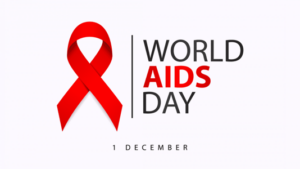December 1, 2023
This World AIDS Day, celebrating community leadership
“Science, when it is inclusive, becomes a powerful tool for change,” says IAVI’s Monica Kuteesa.
 This World AIDS Day, focused on the theme “letting communities lead,” is an opportunity to stress how vital it is to center our efforts in the countries where global HIV burdens are highest. Understanding the needs and preferences of end users, health care providers, and policymakers is essential to developing and delivering products with the fewest barriers to access and the greatest potential for impact. As a key element of our product development vision, we and our partners engage local communities to inform plans for product development and implementation in real-world settings. We are proud to play an important role in facilitating these collaborations and applaud the tireless commitment of dedicated community volunteers, partners, researchers, clinicians, advocates, host country governments and community workers. IAVI highlights the perspectives from communities on clinical research in our newsletter, VOICES.
This World AIDS Day, focused on the theme “letting communities lead,” is an opportunity to stress how vital it is to center our efforts in the countries where global HIV burdens are highest. Understanding the needs and preferences of end users, health care providers, and policymakers is essential to developing and delivering products with the fewest barriers to access and the greatest potential for impact. As a key element of our product development vision, we and our partners engage local communities to inform plans for product development and implementation in real-world settings. We are proud to play an important role in facilitating these collaborations and applaud the tireless commitment of dedicated community volunteers, partners, researchers, clinicians, advocates, host country governments and community workers. IAVI highlights the perspectives from communities on clinical research in our newsletter, VOICES.
IAVI is proud that this World AIDS Day our messages — and our messengers — are coming from the communities most impacted by HIV. In the United Kingdom, IAVI, together with the All-Party Parliamentary Group on HIV/AIDS, organized a briefing on R&D for new tools to fight HIV/AIDS on November 28. Maggie Throup, MP, chaired the event, which took place in Parliament. Kundai Chinyenze, IAVI’s chief of party, ADVANCE and IAVI Africa director, gave a moving presentation on how she was inspired to start work on AIDS vaccine research, together with an update on progress towards developing a vaccine and ongoing clinical trials. Ben Coates, IAVI’s European advocacy manager, also spoke about the UK government’s record of investing in global health research and development and the reasons behind recent cuts to PDP funding.
IAVI leaders provided insight into the state of HIV vaccine development in media this World AIDS Day. Kundai Chinyenze was interviewed by the BBC Spain about IAVI’s work to develop an HIV vaccine, grounding the continued, essential need for the vaccine in her own story. IAVI’s Johan Vekemans, senior science and clinical advisor, spoke with Die Zeit about how mRNA technology may be leveraged to develop an HIV vaccine.
IAVI’s Monica Kuteesa, director of epidemiology and biostatistics, published an op-ed in The EastAfrican highlighting the need to engage adolescent girls and young women from high-burden communities directly in scientific research. She writes, “The current underrepresentation of adolescent girls and young women in biomedical trials is more than a missed scientific opportunity — it’s a failure to safeguard the health of those who stand to gain the most. Our research boundaries must extend further to include young women, not just as participants but also as leaders, understanding and adapting to their unique needs and perspectives. Science, when it is inclusive, becomes a powerful tool for change.”
This is the message we can all champion this World AIDS Day.
IAVI celebrates advances in local leadership happening across global health
A positive step forward for the field
This World AIDS Day marks 20 years since the launch of the President’s Emergency Plan for AIDS Relief (PEPFAR), the flagship U.S. government program that has transformed prevention, care, and treatment for HIV in over 50 low-income countries. The successes of PEPFAR and the U.S. government’s overall response to HIV have been extraordinary, with PEPFAR reporting over 25 million lives saved.
As part of our longstanding efforts aimed at ensuring robust, sustainable research and development (R&D) systems in Africa, we applaud the United States Agency for International Development’s (USAID) new HIV Vaccine Innovation, Science, and Technology Acceleration in Africa (HIV-VISTA) project — BRILLIANT (BRinging Innovation to cLinical and Laboratory research to end HIV In Africa through New vaccine Technology). It marks USAID’s first direct investment in an Africa-based prime recipient for HIV vaccine R&D, led by the South African Medical Research Council (SAMRC). BRILLIANT includes 11 research organizations in Kenya, Nigeria, South Africa, Tanzania, Uganda, Zambia, and Zimbabwe. You can read more about VISTA through the USAID press release.
We believe the development of a globally accessible, effective HIV vaccine can only be achieved by enabling global R&D partnerships and genuine collaboration that will drive the sharing of discoveries to spur innovative science. We are heartened by USAID’s commitment to support this accomplished consortium and build on the extensive experience of scientific leaders in Africa. Through ADVANCE (Accelerate the Development of Vaccines and New Technologies to Combat the AIDS Epidemic), IAVI looks forward to its future collaboration with BRILLIANT as expanding opportunities for scientists across sub-Saharan Africa to advance HIV vaccine R&D while leveraging lessons learned from decades of U.S. government investments and working jointly to advance HIV science and the development of promising new prevention technologies.